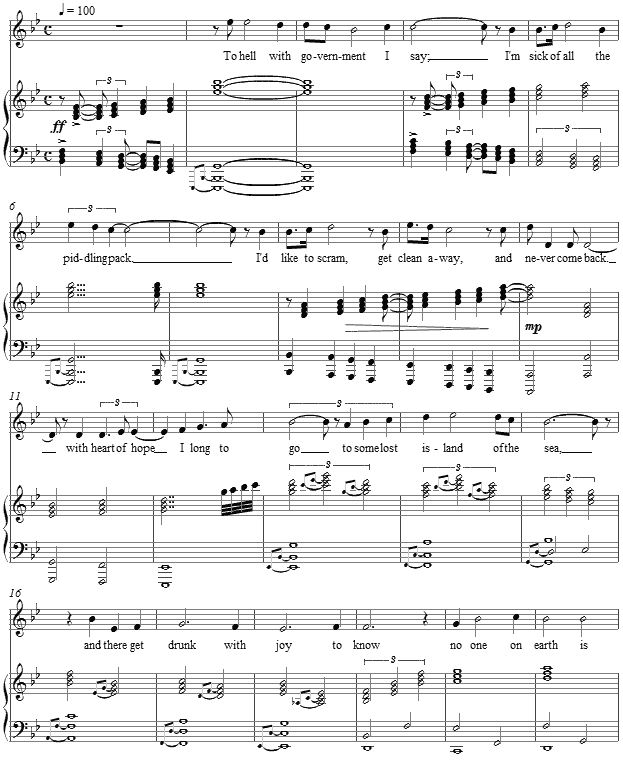Music and Texts of GARY BACHLUND
Vocal Music | Piano | Organ | Chamber Music | Orchestral | Articles and Commentary | Poems and Stories | Miscellany | FAQs
I Am Freedom's Fool - (2008)
Robert W. Service
for medium voice and piano
for M. William Krasilovsky
This text remains under copyright and is therefore not fully reproduced herein.
To hell with Government I say;
I'm sick of all the piddling pack.
I'd like to scram, get clean away,
And never, nevermore come back.
With heart of hope I long to go
To some lost island of the sea,
And there get drunk with joy to know
No one on earth is over me.
There will be none to say me nay,
So from my lexicon I can
Obliterate the word "obey",.....[ 6 pages, circa 4' 10" ]
Robert W. Service
The sentiment of a patriot to freedom rather than to government is a sound and sterling thought. Living in this time of my life in Berlin, Germany, I am daily aware that at one time this nation under another government and flag would have enslaved and murdered me for being merely who I am, as they did to millions of human beings. That being said, the notion of loyalty to a flag or nation which might betray the high ideals of freedom speaks powerfully to me as an artist, as they did for this poet who expressed himself so clearly. For those of a mind to read more on this, please see my article, On Government and Art.
Robert William Service (1874-1958) was a poet and writer, well known for his work about the Canadian North, including such atmospheric, dramatic poems as "The Shooting of Dan McGrew," "The Law of the Yukon," and "The Cremation of Sam McGee." Born in England and schooled in Scotland, he made his fame as a writer in Canada with the 1907 publication of The Spell of the Yukon and Other Verses. A career as writer then led him to travel the world. During WWI he served as an ambulance driver for the Canadian Red Cross and served as war correspondent for the Canadian government. For a time he lived in France, and after being caught in Poland at the outbreak of WWII, he spent much time in California before returning to spend the remainder of his life in Brittany. Having seen the brutality of two wars, his aversion to government is both understandable and wholly justified.
A number of poets and thinkers whose texts I have set to music agree across centuries that government can so easily abuse power. For this Ambrose Bierce and Carl Sandburg wrote as they did, as did many of the fine American poets published in The Book of American Negro Poetry, published in 1922; one such example is that portion of Paul Lawrence Dunbar's text which tells us, "An' ez fur boss, I'll be my own, / I like to jest be let alone...." (in An Easy Goin' Feller) Moreover the advice of American poet E. E. Cummings is apt to this discussion, as he encourages us not to be "nobody-but-yourself." The ultimate picture of government abuse in the skilled rhyme and odd humor of a poet comes from G. K. Chesterton, in his The Horrible History of Jones.
Thus, Robert Service's declamation, "to hell with government" fits the picture as painted in words and rhyme, as in the plastic and dramatic arts, that freedom is not an abstraction, but rather a part of the larger and more inclusive phrase, "freedom from oppression." Often this is quite the same thing as "freedom from government." This is among the universal human rights which an artist should mercilessly uphold for another, if he is to wish it for himself. One will note that Robert Service finds "The laws of Nature and of God / Are good enough for guys like me. [ 1 ]
And so, per the suggestion by the estate to re-title the work, I say simply with Robert Service and so many other freedom-minded, individualist artists, "I am Freedom's Fool." This is, after all, true political resistance in the old fashioned sense in which individual freedom opposes all forms of government when grown too large. After all, Robert Service, who remained a British subject throughout his life, realized the same truth which American Walt Whitman taught a century earlier, "Once unquestioning obedience, / once fully enslaved, / no nation, state, city of this earth, / ever afterward resumes its liberty," in his To The States.
The inane enthusiasm for those leaders who manage to amass around themselves a "cult of personality" so often evidence the all too human urge to demand and so often receive "unquestioning obedience." I have have found this among political partisans of various flavors and stripes who seem unable to think critically for themselves and resent when someone else disagrees with their cultish slavishness. For them and others like them, I say with Robert Service, "To hell with government."
The text comes from the anthology, Rhymes of a Roughneck, A Book of Verse, New York: Dodd Mead, 1950, and London: Ernest Benn, 1950
NOTES
[ 1 ] Though ridiculed today, the notion of "the laws of Nature and of God" is wholly consistent with centuries' of high culture. One such similar citation drawn from centuries of such observations comes to us from Dante Alighieri, (1308-1321), "En la Sua voluntade è nostra pace," from the Divine Comedy. (In Your will is our peace).

